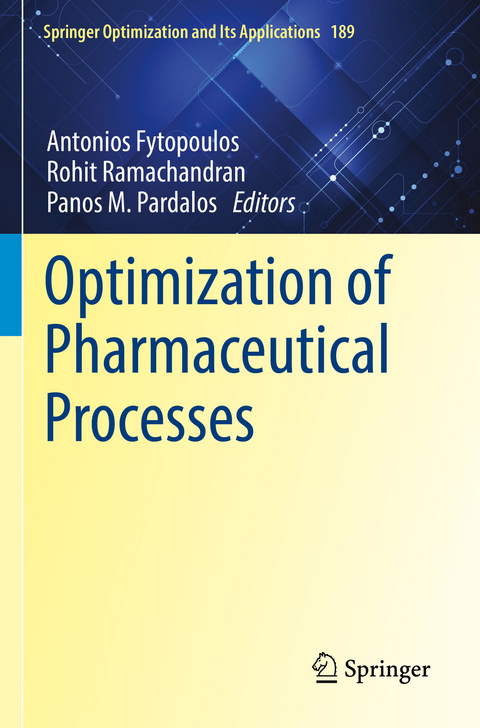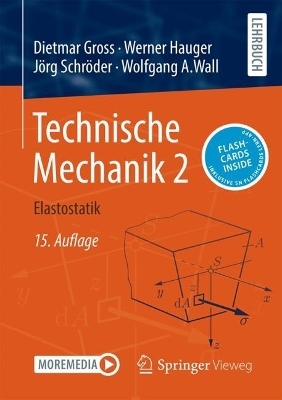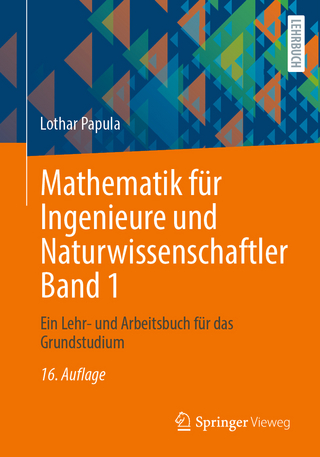
Optimization of Pharmaceutical Processes
Springer International Publishing (Verlag)
978-3-030-90926-0 (ISBN)
Optimization of Pharmaceutical Processes presents contributions from leading authorities in the fields of optimization and pharmaceutical manufacturing. Formulated within structured frameworks, practical examples and applications are given as guidance to apply optimization techniques to most aspects of pharmaceutical processes from design, to lab and pilot scale, and finally to manufacturing. The increasing demand for better quality, higher yield, more efficient-optimized and green pharmaceutical processes, indicates that optimal conditions for production must be applied to achieve simplicity, lower costs and superior yield. The application of such methods in the pharmaceutical industry is not trivial. Quality of the final product is of major importance to human health and the need for deep knowledge of the process parameters and the optimization of the processes are imperative.
The volume, which includes new methods as well as review contributions will benefit awide readership including engineers in pharmaceuticals, chemical, biological, to name just a few.
lt;b> Antonios Fytopoulos is currently a PhD candidate at KU Leuven. He graduated from the Hellenic Army Academy in 2006 as an officer and pursued a military career, where he received numerous awards and currently, he holds the rank of Major. In 2018 he received his diploma from the School of Chemical Engineering of the National Technical University of Athens, where he graduated in the top 5% of his class. His research interests include crystallization, process optimization, modeling and deracemization methods. His current work focuses on Population balance - based optimization of Viedma Deracemization. He has participated and presented his research at several national and international conferences and coauthored articles in international peer-reviewed journals.
Dr. Rohit Ramachandran is currently Associate Professor & Chancellor's Scholar at the Dept. of Chemical & Biochemical Engineering and the Engineering Research Center of Structured Organic Particulates, at Rutgers University. He received his B.Eng and M.Eng in Chemical Engineering, with a minor in Law, from the National University of Singapore in 2003 and 2005 respectively. This was followed by his PhD in Chemical Engineering from the Center of Process Systems Engineering, Imperial College London in 2008. Thereafter he pursued a postdoctoral associate position at the Dept of Chemical Engineering, Massachusetts Institute of Technology (MIT). His current research interests are in modeling, control, optimization and experimental validation of pharmaceutical and chemical processes. He has published more than 100 peer reviewed journal articles and has presented his work at numerous national and international conferences as well as at invited seminars at various universities and industrial companies. He has won several awards such as the NSF Career award for young faculty, two NIPTE Young investigator awards, the Rutgers Chancellor's Scholar award, the Rutgers Board of Trustees award for research excellence and the AIChE Process to Development QbD award for contributions in pharmaceutical drug product manufacturing.
Panos M. Pardalos serves as Distinguished Professor of Industrial and Systems Engineering at the University of Florida. Additionally, he is the Paul and Heidi Brown Preeminent Professor in Industrial & Systems Engineering. He is also an affiliated faculty member of the Computer and Information Science Department, the Hellenic Studies Center, and the Biomedical Engineering Program. He is also the Director of the Center for Applied Optimization. Dr. Pardalos is a world leading expert in global and combinatorial optimization. His recent research interests include network design problems, optimization in telecommunications, e-commerce, data mining, biomedical applications, and massive computing. He has co-authored and co-edited more than 30 books, as well as publishing more than 600 journal articles and conference proceedings. Prof. Pardalos is a Fellow of AAAS (American Association for the Advancement of Science), Fellow of American Institute for Medical and Biological Engineering (AIMBE), and EUROPT. He is a Distinguished International Professor by the Chinese Minister of Education; Honorary Professor of Anhui University of Sciences and Technology, China; Elizabeth Wood Dunlevie Honors Term Professor; Honorary Doctor, V.M. Glushkov Institute of Cybernetics of The National Academy of Sciences of Ukraine; Foreign Associate Member of Reial Academia de Doctors, Spain; and Advisory board member of the Centre for Optimisation and Its Applications, Cardiff University, UK. He is also the recipient of UF 2009 International Educator Award; Medal (in recognition of broad contributions in science and engineering) of the University of Catani, Italy; EURO Gold Medal (EGM); Honorary Doctor of Science Degree, Wilfrid Laurier University, Canada; Senior Fulbright Specialist Award; Univers
Process control and intensification of solution crystallization (Gong).- Method of characteristics for the efficient simulation of population balance models (D. Braatz).- Linearized parameter estimation methods for modeled crystallization phenomena using in-line measurements and its application to optimization of partially seeded crystallization in pharmaceutical processes (Hirasawa).- Mathematical modeling of different breakage PBE kernels using Monte Carlo simulation results (Kumar).- Optimization of tablet coatingMayur M Patel Continuous twin screw granulation processing (Douroumis).- Continuous powder feeding: Equipment design and material considerations (Crean).- Ultrasound for improved encapsulation and crystallization with focus on pharmaceutical applications (Gogate).- Nonsmooth modeling for simulation and optimization of continuous pharmaceutical manufacturing processes (Patrascu).- Integrated synthesis, crystallization, filtration and drying of active pharmaceutical ingredients: a model-based digital design framework for process optimization and control (K. Nagy).- Fast model predictive control of modular systems for continuous manufacturing of pharmaceuticals (D. Braatz)..- Dynamic modeling and control of a continuous biopharmaceutical manufacturing plant (Mansouri).- Overview of scheduling methods for pharmaceutical production (T. Maravelias).- Model-based risk assessment of mAb developability (Glassey).- Design framework and tools for solid drug product manufacturing processes (Sugiyama).- Challenges and solutions in drug product process development from a material science perspective (Stauffer).
| Erscheinungsdatum | 09.04.2023 |
|---|---|
| Reihe/Serie | Springer Optimization and Its Applications |
| Zusatzinfo | XIV, 435 p. 153 illus., 117 illus. in color. |
| Verlagsort | Cham |
| Sprache | englisch |
| Maße | 155 x 235 mm |
| Gewicht | 688 g |
| Themenwelt | Mathematik / Informatik ► Mathematik ► Angewandte Mathematik |
| Medizin / Pharmazie ► Pharmazie ► PTA / PKA | |
| Technik ► Maschinenbau | |
| Schlagworte | crystallization processes • Granulation • green pharmaceutical processes • milling granulation • Pharmaceutical manufacturing • pharmaceutical optimization • Polymorphs • Process Chemistry • small molecule pharmaceuticals • tableting • Viedma ripening |
| ISBN-10 | 3-030-90926-3 / 3030909263 |
| ISBN-13 | 978-3-030-90926-0 / 9783030909260 |
| Zustand | Neuware |
| Informationen gemäß Produktsicherheitsverordnung (GPSR) | |
| Haben Sie eine Frage zum Produkt? |
aus dem Bereich


